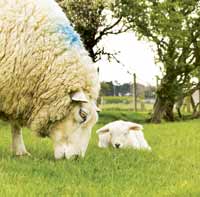VIDEO: Check roots for grass growth knowledge

Compaction and finding the right grass varieties for your farm were the hot topics at last week’s re-seeding event at Harper Adams University College, Shropshire
Knowing how much grass your land is producing is the key to ensuring your leys are making you the most money. Grass that’s under-performing is costing far more than you realise.
That was the message from Kingshay Trust adviser Paul Robinson when he addressed farmers at the event – and he used the opportunity to encourage every farmer to go home and find a spade and to start digging holes.
“One you’ve realised your leys are under-performing there are plenty of high-tech ways of tackling the problem – but for my money you can’t beat a spade,” said Mr Robinson.
“A lot of land is heavily compacted – far more than many farmers imagine. Dig a hole about 2ft square and 2ft deep and take a look. If you’ve got compaction you won’t see good root systems going down deeply into the soil and that means your grass isn’t being allowed to properly develop.
“In many cases we’ve probably been rolling land at an inappropriate time of year and it has made matters worse. But the advent of slit-aeration machines can now help sort out compaction problems and in many cases these machines should be used rather than rollers to open up the top 3-6in and let air into the soil,” said Mr Robinson.
Video: Re-seeding advice
Although he agreed slit-aerators would only go so far into compacted soil, it was their ability to open up the top layer and let in air that created the aerobic environment in which micro-organisms could thrive and in turn benefit the sward’s development.
“The better the environment in that top layer, the more worms you’ll have and that means soil compaction will be reduced,” said Mr Robinson.
And those farmers who decided to take his advice and dig holes to check the condition of the soil beneath their pastures should be looking for vertical fissures and cracks in the soil profile.
“Horizontal fissures are more worrying and signify greater risk of further compaction. There are machines that can address this problem further down in the soil, but timing is critical. Get advice before you tackle this job, but grassland needs to be done when land is starting to dry out, but before conditions become too hard.”
The re-seeding event was organised by EBLEX, DairyCo, HCC, NIAB, BGS and BSPB.
